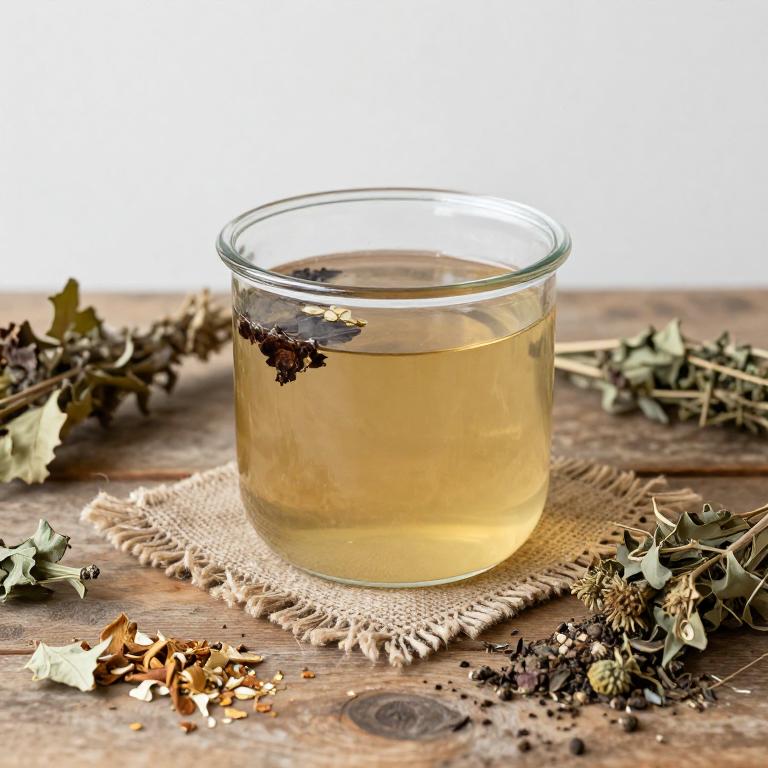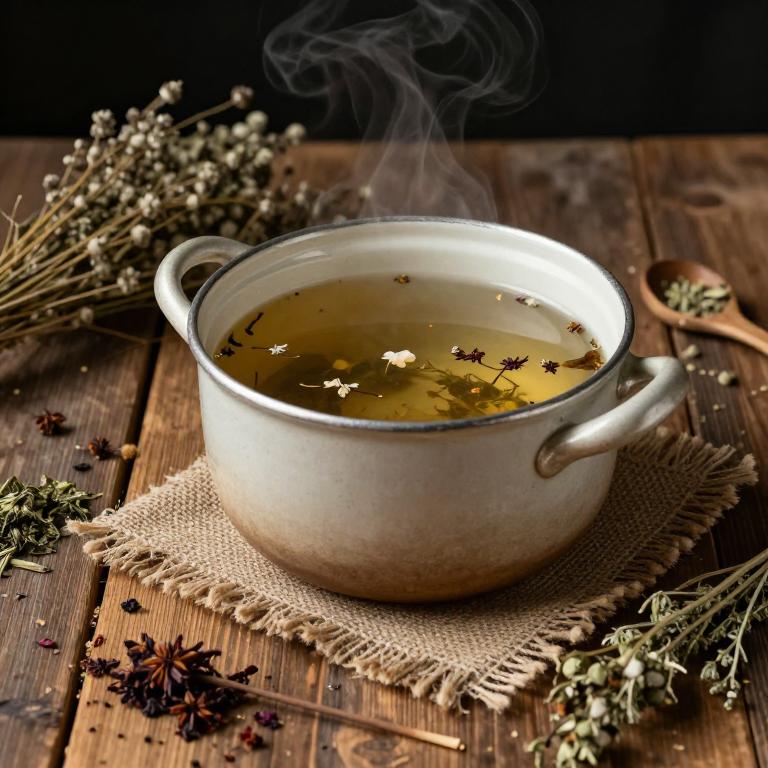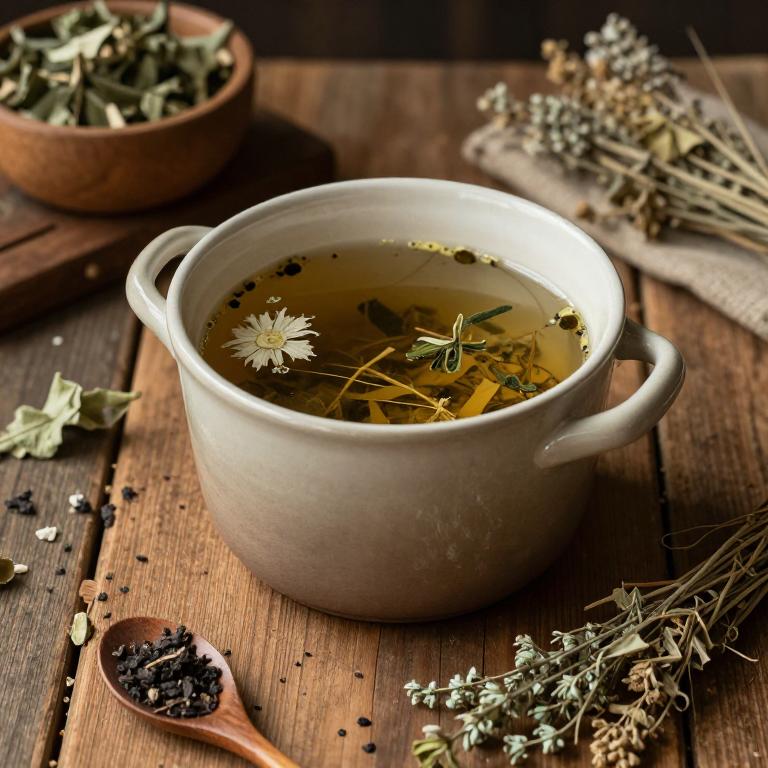10 Best Herbal Decoctions For Indigestion

Herbal decoctions have been traditionally used to alleviate symptoms of indigestion by promoting digestive health and reducing discomfort.
These preparations typically involve boiling a mixture of herbs such as ginger, fennel, cumin, and peppermint in water to extract their active compounds. The warming and soothing properties of these herbs can help ease bloating, nausea, and a feeling of heaviness after meals. Many people find relief from herbal decoctions due to their natural and gentle approach compared to pharmaceutical alternatives.
However, it is advisable to consult a healthcare professional before using herbal remedies, especially for prolonged or severe indigestion.
Table of Contents
1. Fennel (Foeniculum vulgare)

Foeniculum vulgare, commonly known as fennel, has been traditionally used in herbal medicine to aid digestion.
Its seeds are often prepared into a decoction by simmering in water, which helps to release active compounds like anethole and fenchone. This herbal decoction is known to soothe the digestive tract and reduce symptoms such as bloating, gas, and indigestion. The mild, licorice-like flavor of fennel makes it a pleasant and palatable remedy for many.
However, it is recommended to consult with a healthcare provider before using fennel decoctions, especially for individuals with existing medical conditions or those taking medications.
2. Ginger (Zingiber officinale)

Zingiber officinale, commonly known as ginger, has been widely used for centuries in herbal medicine to alleviate symptoms of indigestion.
Its active compounds, such as gingerol and shogaol, possess anti-inflammatory and carminative properties that help reduce nausea, bloating, and stomach discomfort. Ginger herbal decoctions are prepared by boiling fresh or dried ginger root in water, allowing the beneficial compounds to infuse into the liquid. These decoctions are often recommended for individuals experiencing digestive upset after meals or during pregnancy.
Regular consumption of ginger decoctions can support gastrointestinal health and improve overall digestion when used as part of a holistic approach to wellness.
3. Cumin (Cuminum cyminum)

Cuminum cyminum, commonly known as cumin, has been traditionally used in herbal medicine for its potential benefits in alleviating indigestion.
The essential oils and active compounds in cumin, such as cuminaldehyde and thymol, are believed to stimulate digestive enzymes and improve gut motility. A herbal decoction made from cumin seeds can be prepared by simmering the seeds in water, allowing the beneficial compounds to infuse into the liquid. This decoction is often consumed after meals to aid in digestion and reduce symptoms like bloating and flatulence.
While generally considered safe, individuals with certain health conditions should consult a healthcare provider before using cumin-based remedies.
4. Licorice (Glycyrrhiza glabra)

Glycyrrhiza glabra, commonly known as licorice root, has been traditionally used in herbal medicine for its potential benefits in treating indigestion.
The active compounds in licorice root, such as glycyrrhizin and flavonoids, may help reduce inflammation in the gastrointestinal tract and soothe digestive discomfort. When prepared as a decoction, licorice root is often consumed as a tea to alleviate symptoms like bloating, nausea, and heartburn. However, long-term use of licorice root decoctions can lead to side effects such as hypertension and potassium loss due to its mineralocorticoid-like effects.
As a result, it is recommended to consult a healthcare provider before using licorice root for persistent indigestion.
5. Peppermint (Mentha piperita)

Mentha piperita, commonly known as peppermint, is widely used in herbal decoctions to alleviate symptoms of indigestion.
The essential oils in peppermint, particularly menthol and menthone, have antispasmodic properties that help relax the smooth muscles of the gastrointestinal tract. When prepared as a decoction, peppermint tea can soothe bloating, gas, and nausea associated with indigestion. It is often recommended for individuals experiencing dyspepsia or irritable bowel syndrome.
However, it should be used with caution in individuals with certain medical conditions or those taking specific medications, as it may interact with some drugs.
6. Black pepper (Piper nigrum)

Piper nigrum, commonly known as black pepper, has been traditionally used in herbal medicine for its digestive benefits.
When prepared as a decoction, black pepper can help stimulate the production of digestive enzymes, aiding in the breakdown of food and reducing symptoms of indigestion. The active compound, piperine, is believed to enhance the absorption of nutrients and improve gastrointestinal motility. To make a decoction, whole black peppercorns are boiled in water for several minutes, then strained and consumed warm.
This herbal remedy is often used in combination with other digestive herbs to provide a more comprehensive approach to managing indigestion.
7. Turmeric (Curcuma longa)

Curcuma longa, commonly known as turmeric, has been traditionally used in herbal medicine for its digestive benefits.
Its active compound, curcumin, possesses anti-inflammatory and antioxidant properties that may help alleviate symptoms of indigestion. Herbal decoctions made from turmeric root are often prepared by boiling the dried rhizome in water to extract its beneficial compounds. These decoctions can help stimulate digestion, reduce bloating, and ease discomfort associated with indigestion.
However, it is important to consult a healthcare professional before using turmeric decoctions, especially for individuals with existing health conditions or those taking medications.
8. Caraway (Carum carvi)

Carum carvi, commonly known as caraway, has been traditionally used in herbal medicine for its digestive benefits, particularly in the treatment of indigestion.
Caraway herbal decoctions are prepared by simmering the dried seeds in water, allowing the active compounds such as essential oils and flavonoids to be extracted. These decoctions are believed to stimulate the production of digestive enzymes and relieve symptoms like bloating and gas. The mild and warm nature of caraway makes it a soothing remedy for the digestive system.
Due to its long history of use and generally mild side effects, caraway decoctions are often recommended as a natural alternative to conventional antacids and digestive aids.
9. Thistle (Silybum marianum)

Silybum marianum, commonly known as milk thistle, has been traditionally used in herbal medicine for its potential digestive benefits.
Herbal decoctions of Silybum marianum are prepared by boiling the dried seeds or leaves in water, creating a potent infusion that may support gastrointestinal health. These decoctions are believed to aid in digestion by stimulating bile production and reducing inflammation in the digestive tract. Some studies suggest that the active compound silymarin in milk thistle may help protect the liver and improve overall digestive function.
However, while anecdotal evidence supports its use for indigestion, more clinical research is needed to fully establish its efficacy and safety.
10. Basil (Ocimum basilicum)

Ocimum basilicum, commonly known as sweet basil, has been traditionally used in herbal medicine for its digestive benefits.
Herbal decoctions made from fresh or dried basil leaves are often prepared by simmering the leaves in water to extract their active compounds. These decoctions are believed to aid in relieving indigestion by stimulating the production of digestive enzymes and reducing bloating. The essential oils in basil, such as eugenol and linalool, contribute to its carminative and antispasmodic properties.
Regular consumption of basil decoctions may support overall digestive health and ease symptoms associated with indigestion.